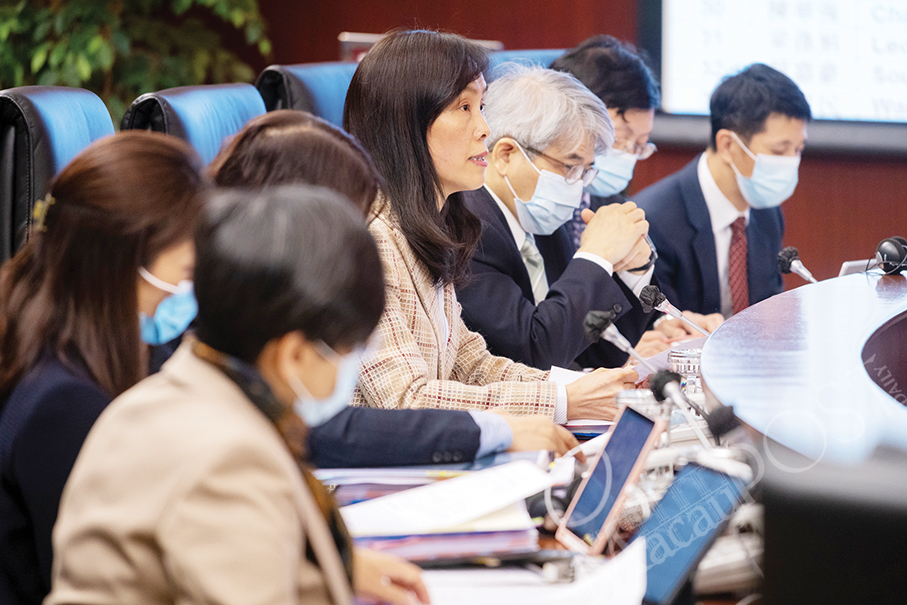Secretary for Social Affairs and Culture Elsie Ao Ieong U said yesterday that the government plans to divide Macau into 30 “COVID-19 affected areas” for the possible implementation of community-based COVID-19 prevention and control measures in the city.
The policy secretary underlined that the implementation of the mainland-style community-based COVID-19 control measures is merely part of the local government’s contingency plan in response to the possibility of Macau confirming new local COVID-19 cases, adding that for the time being there is no need for the government to roll out the measures.
Ao Ieong also revealed that according to the local government’s plan for the implementation of the measures, the Macau Health Code of all residents living in the areas where the COVID-19 epidemic emerges will indicate yellow, in which case they will not be allowed to cross the mainland-Macau border.
Ao Ieong made the remarks during a one-day Q&A session in the legislature’s hemicycle about her portfolio’s policy guidelines for next year.
The policy secretary first told reporters in September that the Macau government was studying the feasibility of the possible implementation of community-based COVID-19 prevention and control measures in the city – in case it confirms new local COVID-19 cases – in references to the mainland. She pointed out at that time that Macau is a small city so that if the local government decides that the mainland-style community-based COVID-19 control measures would be adopted locally, it would have to divide areas affected by COVID-19 in a “very accurate” way. She said that in case Macau confirms new local COVID-19 cases, the smaller the size of the affected area, the fewer residents would be affected by the government’s strict COVID-19 community-based measures.
According to official data, Macau’s land area amounts to 32.9 square kilometres. Its population stood at 682,800 at the end of the third quarter, according to the Statistics and Census Bureau (DSEC).
During yesterday’s plenary session, Ao Ieong pledged in her introductory speech about her portfolio’s policy guidelines for next year that the local government will continue to ensure the sound implementation of its COVID-19 prevention and control work which, she said, was expected to be “normalised” in the near future. Ao Ieong noted that the government has been drafting a plan on how to implement the mainland-style community-based COVID-19 control measures, officially known as accurate COVID-19 prevention and control measures divided by areas and levels.
Ao Ieong said that both the National Health Commission (NHC) and the Guangdong Health Commission have green-lighted the Macau government’s plan for the implementation of accurate COVID-19 prevention and control measures divided by areas and levels. She underlined that the implementation of the community-based COVID-19 control measures is merely part of the Macau government’s contingency plan and there is no need to roll out the measures for the time being.
Ao Ieong said that the local government preliminarily plans to divide Macau into 30 COVID-19 affected areas in its proposal of the accurate COVID-19 prevention and control measures divided by areas and levels. According to the plan, the local health authorities will classify the areas where COVID-19 epidemic emerges as medium-risk or high-risk areas, she said.
According to Ao Ieong, the Macau Health Code of all residents living in the areas which have been classified as medium-risk areas will indicate yellow, in which case they will not be allowed to cross the mainland-Macau border. The health authorities will then complete COVID-19 tests for all the affected area’s residents within one week, Ao Ieong said, adding that the health authorities will change the Macau Health Code colour of those who have met certain conditions back to green.
Ao Ieong said that a particular area where the number of confirmed COVID-19 patients exceeds a certain number, for example 10, will be classified as a high-risk area, and residents living there will be subject to even stricter COVID-19 control measures.
Ao Ieong also said that the Health Bureau (SSM) has been constantly recruiting more medical staff for its COVID-19 prevention and control work since the COVID-19 epidemic emerged in Macau, pointing out that the sampling for all COVID-19 testing in the city has always been carried out by medical staff members. She said that the Health Bureau has been training more medical staff members capable of collecting samples from those undergoing their nucleic acid tests (NATs), in preparation for the possible case in which COVID-19 epidemic emerges in certain areas out of the 30 areas, with the aim of ensuring that all the affected residents can undergo their COVID-19 tests in a short time.
500-bed makeshift hospital
Meanwhile, Ao Ieong also said that the government has completed drafting a contingency plan to set up a makeshift hospital where 500 beds will be available for COVID-19 patients. She reaffirmed that the location for the makeshift hospital will be far away from residential neighbourhoods.
Ao Ieong also said that if the government needed to set up a COVID-19 makeshift hospital, the setting-up could be completed within one week.
Emergency COVID-19 vaccines
Meanwhile, Ao Ieong also said that in addition to the Macau government’s ongoing discussions with vaccine producers for its aim of purchasing 1.4 million doses of COVID-19 vaccines covering the city’s whole population – two shots for each person, the Macau government has also been discussing with various vaccine producers the purchase of emergency COVID-19 vaccines, which were expected to be delivered to Macau by the end of this year.
The policy secretary did not reveal which company or companies will provide the emergency jabs.
Ao Ieong said that frontline workers subject to higher COVID-19 risk, such as medical workers and firefighters, will be the first to get shots of the emergency COVID-19 vaccines to be delivered to Macau.
Ao Ieong also said that Macau government now expected the 1.4 million doses of COVID-19 vaccines to be delivered to Macau in the first half of next year. Based on a more optimistic estimate, the government expected them to be available in Macau in the first quarter of next year, she said.
Ao Ieong said that once COVID-19 vaccines are available for the city’s population, the government will only arrange for them to get vaccinated gradually, with those who need to work or study outside Macau to get vaccinated first.

Secretary for Social Affairs and Culture Elsie Ao Ieong U (not wearing a facemask) speaks during yesterday’s Q&A session about her portfolio’s 2021 policy guidelines in the Legislative Assembly’s (AL) hemicycle.
Photo: GCS








